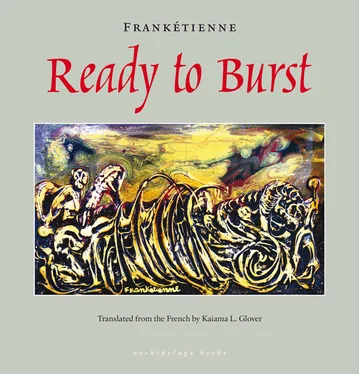Franketienne - Ready to Burst
Здесь есть возможность читать онлайн «Franketienne - Ready to Burst» весь текст электронной книги совершенно бесплатно (целиком полную версию без сокращений). В некоторых случаях можно слушать аудио, скачать через торрент в формате fb2 и присутствует краткое содержание. Год выпуска: 2014, Издательство: Archipelago, Жанр: Современная проза, на английском языке. Описание произведения, (предисловие) а так же отзывы посетителей доступны на портале библиотеки ЛибКат.
- Название:Ready to Burst
- Автор:
- Издательство:Archipelago
- Жанр:
- Год:2014
- ISBN:нет данных
- Рейтинг книги:3 / 5. Голосов: 1
-
Избранное:Добавить в избранное
- Отзывы:
-
Ваша оценка:
- 60
- 1
- 2
- 3
- 4
- 5
Ready to Burst: краткое содержание, описание и аннотация
Предлагаем к чтению аннотацию, описание, краткое содержание или предисловие (зависит от того, что написал сам автор книги «Ready to Burst»). Если вы не нашли необходимую информацию о книге — напишите в комментариях, мы постараемся отыскать её.
Ready to Burst
The New York Times
Ready to Burst — читать онлайн бесплатно полную книгу (весь текст) целиком
Ниже представлен текст книги, разбитый по страницам. Система сохранения места последней прочитанной страницы, позволяет с удобством читать онлайн бесплатно книгу «Ready to Burst», без необходимости каждый раз заново искать на чём Вы остановились. Поставьте закладку, и сможете в любой момент перейти на страницу, на которой закончили чтение.
Интервал:
Закладка:
The divine army of angels would most often intervene in countries ravaged by war and famine.
These winged creatures came in great numbers. Their presence was being felt in the capital, in the provincial towns, in the plains, in the mountainous areas, and even in the most out-of-the-way places. Their missionary equipment consisted of an olive green satchel and a dark brown baton. Rumor had it that they’d be going ahead with a massive distribution of food, clothing, and medicine. And that they’d also bring a special vitamin. An herbal tea for the anemic. An infusion of green leaves. The streets are crowded with people trying to figure out where to find the distribution sites. A noisy, feverish day.
However, at sunset, the people’s emotion had reached its high point, such that everyone suddenly lost the ability to speak. Hearts caught in their chests. Tongues stuck behind their teeth. People could only communicate with gestures and signs. The art of miming. Even the elderly, one foot in the grave, had never seen anything like it in their lives. A frightening event beyond the scope of the imagination. A complete upheaval. A horrible and sudden metamorphosis. At dusk, the angels transformed into terrifying beasts. Horns on their heads. Hooked claws. Chewed-up lips through which yellowing, pointed teeth peeked out. Their messenger’s batons became threatening pitchforks. They screamed in a choppy, guttural language rife with onomatopoeia. And they didn’t hide their hunger for living flesh.
All doors are double-locked. But no one really sleeps, paralyzed with astonishment. Several weeks go by without anyone reacting to the monsters. Suddenly, one morning, over by the Cathedral, there’s an unexpected meeting of some brave compatriots who call on the population to get ahold of itself. To get itself together. To move past its fear. To coordinate a national effort to throw off the invaders, the infamous and terrible angel-demons.
Leaning against an electric pole, Raynand listens from a distance to the feverish words of the orators who speak one after another from the low wall that serves as their tribunal. Attracted mainly by the swirling of the crowd, he scrutinizes the faces of the people who make up this heterogeneous assembly. Suddenly hearing a familiar voice, dense with emotion, Raynand raises his head to the stage. He recognizes the imposing and gentle silhouette of Paulin, who has launched into a moving indictment of the wolves who had come from far away, accusing them of having used trickery to invade the sheepfold, the heroic land of the ancestors.
My blood brothers, today we are struck by misfortune and have become paralyzed with fright. Disguised as angels of goodness, a swarm of voracious beasts have destroyed our fields. With their corrosive saliva, they burn the flesh of our women, our children. Full of loathing, they spit on us. Their disgusting breath hovers over the entire island. Strangles us. Submerges us in a hell of sulfur and fire. Their hooves mark our land with the seal of disgrace. We know of no yardstick with which to measure this affront, of no scale capable of weighing this insult, so great is our humiliation. At first, too stunned by their insolence, their hypocrisy, we didn’t react. Now the time has come to get rid of our sterile fears. To unburden ourselves of past hatreds so as to meet this enemy with united resistance, a seamless front, a sturdy shield dipped in the courage of the true Haitian.
A storm of applause, fed by deafening screams, interrupts the speaker. Raynand threads his way through the crowd, trying his best to carve out a path through the tightly packed elbows of the heated assembly. He wanted to make his way to Paulin, whom he hadn’t seen in so long. He so desperately wanted to see him up close. To talk to him after the meeting. To shake his hand.
… This isn’t the first time these dreadful monsters have raided a peaceful country. Five centuries ago they came by sea, not yet having sprouted wings. They came with their Holy Bible, which they quickly bartered for Cibao’s flakes of gold. Having exterminated millions of Indians within a single decade, they then descended on Africa like an army of ravenous grasshoppers. For three centuries they threw the very womb of the continent into turmoil, made into the widow of so many athletes and so many princes become slaves. In the meantime, they turned Saint-Domingue into an insufferable hell of shame, gunpowder, and whips. The years went by. And one morning, Toussaint Louverture, Jean-Jacques Dessalines, Capois-La-Mort, Henri Christophe, Alexandre Pétion, legitimate heirs to the sun, planted light — an inextinguishable star — in the very core of Haiti.
The whole crowd, in an inexpressible communion, cut off Paulin’s words with a clapping of hands, with cheers and deafening cries. The most exuberant shook handkerchiefs and hats to show the speaker their boundless approval. Their indignation. Their resolve to enter into battle. Their faith that they’d win this fight. It was written on every face.
… They built up their material riches, their art, their science, and their technology at the expense of four continents. And today they dare speak to us about their “civilization”! Can they already have forgotten that it would suffice to scratch ever so lightly at any stone of their buildings, any slab of their streets, any sheet of metal in their machines to uncover the blood of the oppressed? Citizens of the Third World, any time you pass through Europe or North America, when you visit the high places of so-called Western culture, speak loudly and march proudly, because you can feel right at home there where the strength of your muscles and the blood of your bodies have helped to make life blossom. Your blood converted in the mill of History into Shakespearean plays, Racinian tragedy, Haydn’s symphonies, Rembrandt’s paintings, and Puccini’s operas; into romantic dramas, stone cathedrals, marble palaces, concrete and metal skyscrapers; into Hegelian dialectic, or Einstein’s formulas, or launching pads. We must remind all those who have profited from our labor, those secular exploiters who disdain us today, that we have contributed to the progress and the beauty of their civilization, in the mines, on the plantations, in their factories, and often under the overseer’s whip. Henceforth, we do not intend to be treated like poor relations and servants. We reject enslavement. And without denying what’s ours, we proclaim our right to enjoy all of the West’s most marvelous conquests and to savor the fruits that ripen on the manure of our sufferings.
With these words, a real electric current passed through the crowd and it reacted as a single being. On its feet, endlessly applauding the speaker, whose pathos-ridden voice became that of two-thirds of the planet.
… Oppressed people of this earth, we need only rely on ourselves. Not even the proletarians of the advanced nations. We blame them, too. In the division of riches between the predators and the prey, they too benefit from our exploitation. And they happily accept the crumbs from the bountiful table of their bosses. For a long time now, they’ve violated their own pledge, which today they consider like some youthful folly. We’ve adopted their rallying cry: Stand up, wretched of the earth! But we’ve remained alone on the pavement. They’re no longer by our side. They haven’t responded to our brotherly appeal. So where are the cohorts of workers from North America, from the great and sublime Europe? We publicly accuse them of being revolutionaries for nothing more than salaries and social services. Their bellies full of waste, the workers in industrialized countries have become wise adults, drunk on their paid vacations, their leisure activities, their beer and their wine. With their insurance policies and social security, they can hold out for a few more centuries. There’s no urgency for them anymore. That’s why they’re biding their time; they stay blind and deaf to our misery. They aren’t threatened. If the body of the snake is on their turf, its voracious head, the devouring head, is definitely on ours, in the Third World. And we should burn down the granaries that feed both the bosses and the workers of the imperialist powers.
Читать дальшеИнтервал:
Закладка:
Похожие книги на «Ready to Burst»
Представляем Вашему вниманию похожие книги на «Ready to Burst» списком для выбора. Мы отобрали схожую по названию и смыслу литературу в надежде предоставить читателям больше вариантов отыскать новые, интересные, ещё непрочитанные произведения.
Обсуждение, отзывы о книге «Ready to Burst» и просто собственные мнения читателей. Оставьте ваши комментарии, напишите, что Вы думаете о произведении, его смысле или главных героях. Укажите что конкретно понравилось, а что нет, и почему Вы так считаете.





![Эрнест Клайн - Ready Player Two [calibre]](/books/438636/ernest-klajn-ready-player-two-calibre-thumb.webp)






